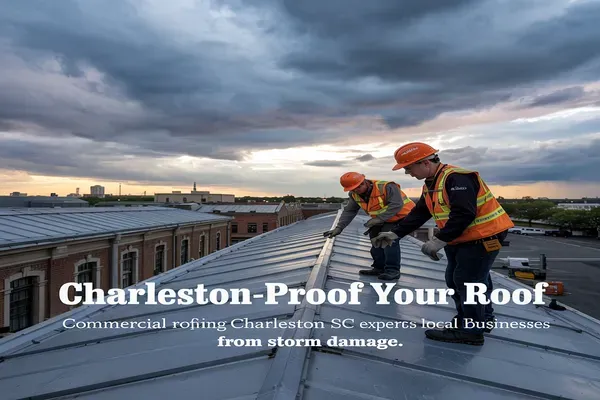
A Business Owner's Guide to Commercial Roofing in Charleston
I. Introduction
After Hurricane Ian caused over $40 million in commercial roof damage across Charleston, local businesses learned a harsh truth: A failing roof doesn’t just leak—it can shut down operations. In a city where humidity hovers at 75% and hurricane winds exceed 130 MPH, commercial roofing isn’t just about materials—it’s about survival.
As a Charleston business owner, your roof faces unique challenges. This guide breaks down the best systems, maintenance strategies, and how to choose a contractor who understands the Lowcountry’s demands.
Why Trust Artigues Roofing?
With 20+ years safeguarding Charleston businesses and GAF Master Elite® certification, we’ve repaired 150+ storm-damaged roofs and installed hurricane-resistant systems from Mount Pleasant to Summerville.
II. Why Charleston’s Climate Demands Specialized Commercial Roofing
1. Humidity & Heat
Charleston’s 50+ inches of annual rainfall and 90°F summers accelerate roof decay. Untreated moisture breeds mold, while thermal expansion cracks seams.
Source: NOAA Climate Data
2. Hurricane Winds
SC building codes now require commercial roofs to withstand 130+ MPH winds. Subpar installations risk catastrophic failure.
3. Salt Air Corrosion
Coastal properties on James Island or Folly Beach need galvanized metal or coated TPO to resist salt-induced rust.
4. Flat Roof Flooding
42% of downtown Charleston’s commercial roofs suffer ponding water, the #1 cause of leaks.
III. Best Commercial Roofing Systems for Charleston Businesses

Case Study: A Daniel Island hotel avoided $250K in storm damage by upgrading to a GACO silicone-coated metal roof.
Pro Tip: White TPO can cut cooling costs by 20%—ideal for North Charleston warehouses.
IV. 3 Must-Have Commercial Roofing Services
1. 24/7 Storm Repairs
Leaks escalate fast. Artigues serves Charleston, Summerville, and Goose Creek with emergency tarping and patching.
2. Pre-Hurricane Inspections
The National Hurricane Center recommends inspecting roofs by June 1.
Our checklist includes:
- Debris removal
- Drain clearing
- Flashing resealing
3. Roof Coatings for Historic Buildings
Extend a roof’s life 10+ years with elastomeric coatings—perfect for downtown’s aged structures.
V. 7 Questions to Ask Your Charleston Roofer
“Are you licensed for commercial work in SC?” (Verify via SCLLR)
“Can you share local references?”
“Do you handle insurance claims?”
VI. Why Artigues Roofing is Charleston’s Trusted Partner
Storm Response: Assisted 50+ businesses post-hurricane since 2015.
Code Compliance: All installations meet 2023 SC Wind Uplift Codes.
Transparency: Detailed quotes with 0 hidden fees.
Google Review:
“Artigues patched our leak in 2 hours—saved our King Street store!” – Harborview Designs
FAQs: Commercial Roofing in Charleston, SC
Q: How much does a commercial roof replacement cost in Charleston?
A: Costs range from 6–6–12 per square foot, depending on materials and complexity. For example, TPO roofs average 7–7–10/sq. ft., while metal roofs can reach $12+. Request a free estimate tailored to your building.
Q: What’s the best roofing material for hurricane resistance?
A: Metal roofing and fully adhered TPO are top choices. Metal roofs can withstand 150+ MPH winds when properly installed, and TPO’s welded seams resist uplift. For coastal areas, choose Galvalume-coated metal to combat salt air.
Q: How often should I schedule roof inspections?
A: Charleston businesses should inspect roofs twice yearly (spring and fall) and after major storms. The National Roofing Contractors Association (NRCA) recommends professional inspections to catch hidden damage.
Q: Can I repair my roof instead of replacing it?
A: If damage is localized (e.g., <25% of the roof), repairs or coatings may suffice. However, roofs older than 20 years or with widespread leaks often need replacement. Schedule an inspection to assess your options.
Q: How do I handle insurance claims for storm damage?
A: Document damage with photos, contact your insurer immediately, and hire a contractor experienced in storm claims (like Artigues). FEMA’s Hurricane Preparedness Guide outlines steps to streamline the process.
Q: What warranties should I expect?
A: Reputable contractors offer:
1. Material warranties (e.g., GAF’s 20–30 year coverage).
2. Workmanship warranties (5–10 years for installation defects).
3. Always review warranty terms for climate exclusions.
Q: How long does a commercial roof last in Charleston?
A: Lifespans vary:
- TPO: 20–25 years
- Metal: 40+ years
- EPDM: 15–20 years
- Salt air and storms can shorten lifespans by 10–15% without proper maintenance.
Q: What are signs my roof needs replacement?
A: Watch for:
1. Frequent leaks (2+ per year)
2. Sagging or ponding water
3. Blistering/membrane cracks
4. Rising energy bills (poor insulation)
Q: Why choose a local contractor over a national chain?
A: Local roofers (like Artigues) understand Charleston’s building codes, humidity challenges, and hurricane risks. They’re also faster for emergency repairs—critical during storm season.